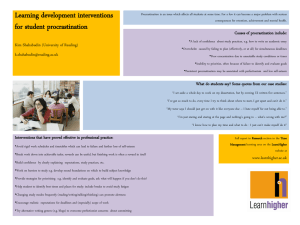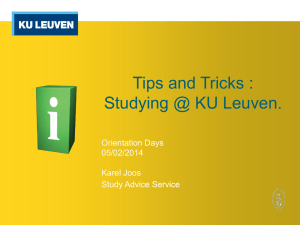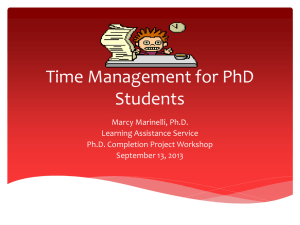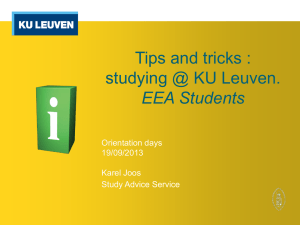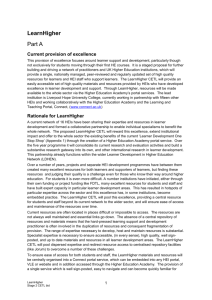Presentation
advertisement
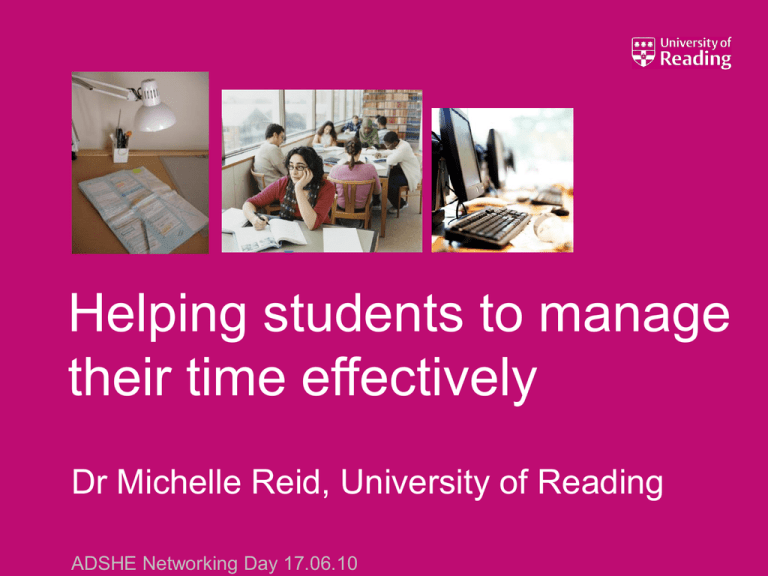
Helping students to manage their time effectively Dr Michelle Reid, University of Reading ADSHE Networking Day 17.06.10 Overview of session • What time management challenges do university students face? • 3 Ps – three crucial areas of time management • Sharing strategies • Useful resources – LearnHigher website, video resources and year planners www.reading.ac.uk/studyadvice Avoiding your time sponges On a post-it note: Write down one of your time sponges (e.g. facebook, emails, talkative colleagues) Pass the post-it to someone next to you and they write a suggestion for avoiding that distraction www.reading.ac.uk/studyadvice Time management at university • Modular degrees - simultaneous deadlines • 2nd / 3rd year can be more challenging transitions • More outside commitments - paid work, desire to enhance CV • Less independent - more reliant on parents • Travel time - commuting / living at home • Wider variety of distractions - online time sponges Almost all students have to adapt their strategies www.reading.ac.uk/studyadvice LearnHigher research into student time management • Planning methods need to be flexible • Prioritising often more of an issue than planning • Procrastination causes greatest anxiety • Formats need to be visual - help students visualise their time usage • Flexibility and multi-use more important than being technologically advanced • Peer advice and strategies often more engaging www.reading.ac.uk/studyadvice Planning • Being informed (knowing deadlines, where to find info, visible plans) underpins planning • Often students believe planning must be rigid • Adapt to suit learning styles / ways of working • Build in catch-up time and flexibility • Different levels – quick fix, short term, long term • Model breaking down project into stages www.reading.ac.uk/studyadvice Prioritising The key concept to managing time at university: • Students often don’t realise they can’t (and aren’t expected) to do everything • Have to be selective – based on personal goals • Different learning styles lead to different priorities and use of time • Students need to justify their decisions to themselves • What are the consequences if I don’t do this? www.reading.ac.uk/studyadvice Procrastination • Lack of confidence about study practices • Overwhelm - failing to plan for multiple deadlines • Distractions - socialising, too many commitments • Poor concentration - unsuitable study conditions or times • Inability to prioritise - failure to identify goals • Persistent procrastination - perfectionism or low-self esteem www.reading.ac.uk/studyadvice Sharing strategies In small groups: 1) Go to one of the A1 sheets (Planning , Prioritising, Procrastination) 2) Discuss any strategies and resources you have used to help your students in this area 3) Write them on the sheet 4) After 5 mins – move to the next sheet – do the same again and add to the list of strategies www.reading.ac.uk/studyadvice Time management resources LearnHigher tutor video resources: www.learnhigher.ac.uk/videoresources/ LearnHigher website: www.learnhigher.ac.uk/learningareas/timemanagement/home.htm LearnHigher Folding Year Planners: www.learnhigher.ac.uk/learningareas/timemanagement/lhyearplanner.htm ASK (Assignment Survival Kit): www.learnhigher.ac.uk/ask/ University of Reading Study Advice website: www.reading.ac.uk/studyadvice www.reading.ac.uk/studyadvice Michelle Reid michelle.reid@reading.ac.uk www.reading.ac.uk/studyadvice
